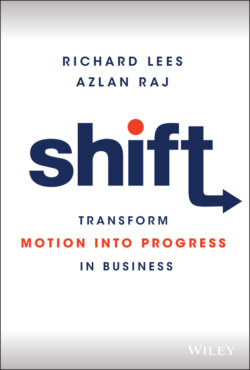Читать книгу Shift - Richard Lees - Страница 20
Don't proxy process for performance
ОглавлениеPicture the scene: You're in a meeting with a client pitching them an innovative solution that you've invented. It's going to cost your client £1 million per year to buy this solution, and they have estimated the opportunity cost for them will be £25 million. You know your solution is ahead of the market and, because it's not available through any other providers, you're confident as you walk through your pitch.
It's a slam-dunk…. Or is it?
There are many examples in business where process gets in the way of logic. Logically you would think that spending £1 million a year to gain £24 million is a no-brainer for a business of any size. However, here is an example of where this has played out in a global organisation.
A client firm was offered a solution to a specific business problem that was not available from any other provider at that time. However, the client firm was concerned that, because the solution wasn't available with any other providers, the firm might not be getting a fair deal. As part of its procurement process, the firm mandated the company pitching to go to tender for the project. Can you see where this is going?
Essentially this meant that the supplier had to facilitate competitors to pitch on its idea. Following the tender process, the client firm was concerned that the supplier might be £200 000 more expensive than the other options. Remember that the opportunity cost to the client was £25 million per year, and that the supplier had the solution ready to go. The client took two years to make a decision, at which point it chose the initial supplier, which was the organisation that pitched the idea in the first place.
The client lost £50 million in opportunity cost to make sure it wasn't spending £200 000 a year more than it should. Its process completely dominated logic. There is a good chance that if the client had paid the £1 million, it could have saved two years of time and taken a chunk of that £50 million in opportunity cost.
This story highlights the danger of allowing your process to dominate logic. We can all think of scenarios in which a business decision has been driven by process rather than by the opportunity that the decision carries. As businesses grow, they become more process-driven and they start to put each decision through the same process; whether it's for a £100 000 project or a £20 million project.
Sometimes you just have to let the logical solution take over and leave the processes behind. If a Formula 1 driver spots a gap in the race to jump up a few places to a pole position, the principal can't let that opportunity slip just because it's not on the race plan, but instead adapts the plan.
